Ash Surname Ancestry ResultsOur indexes 1000-1999 include entries for the spelling 'ash'. In the period you have requested, we have the following 814 records (displaying 541 to 550): Single Surname Subscription | | | Buying all 814 results of this search individually would cost £4,656.00. But you can have free access to all 814 records for a year, to view, to save and print, for £100. Save £4,556.00. More... |
These sample scans are from the original record. You will get scans of the full pages or articles where the surname you searched for has been found. Your web browser may prevent the sample windows from opening; in this case please change your browser settings to allow pop-up windows from this site. Boys entering Leeds Grammar School: Upper (Classical) Department
(1863)
The admission books for Leeds Grammar School from 1820 to 1900 were edited by Edmund Wilson and published in 1906. The series of registers is almost complete for the period, there being in addition admission registers for the Lower (or Commercial) Department from 1856 to 1865, and lists of boys in the school in 1856, and in the Commercial Department in 1861. The entries are arranged by date or term of admission: a sequential number is given first, then surname, christian name, and, after a dash, father's christian name, occupation, and address; another dash, and then the age of the boy at admission, and often his year of leaving (with the abbreviation r. for 'removed' or 'left'). r.* means left without notice; (o) or S. or Stranger or Foreigner indicates a boy not on the foundation. The editor was unable to divine the meaning of the abbreviation (Q) or the asterisks prefixed to most entries in 1856 to 1860, but dutifully copies them into the text. In smaller type he then proceeds, where possible, to add some information about the boy's subsequent career.ASH. Cost: £4.00.  | Sample scan, click to enlarge
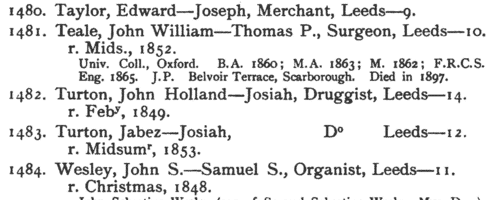
| Missionaries and contributors
(1863)
The Evangelical Magazine and Missionary Chronicle records the work of Christian missionaries throughout the world, and of the supporting missionary societies collecting money for the work in the British Isles. Contributions are listed by congregation, and by family members making donations.ASH. Cost: £8.00.  | Sample scan, click to enlarge
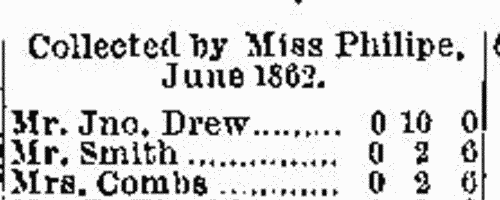
| Patentees of New Inventions
(1863)
Abstracts of British patents for new inventions applied for and granted from 1 January to 31 December 1863: giving date, name and address, and short description of the invention. It is then stated whether 'Letters patent sealed' or 'Provisional protection only'.ASH. Cost: £6.00.  | Sample scan, click to enlarge
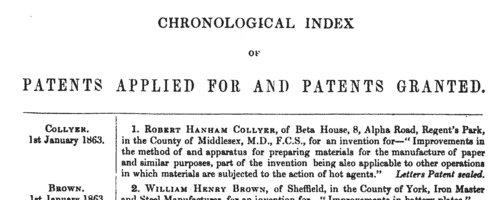
| The Loss of the Lord Raglan: Crew
(1863)
The Lord Raglan sailed from Liverpool with emigrants for Melbourne 23 February 1863. The ship was last spoken on 24 March 1863 in the Atlantic just north of the equator. Neither the ship nor any of the crew or passengers were heard of again: there was a report that a fire had been seen in her direction.ASH. Cost: £6.00.  | Sample scan, click to enlarge

| Boys entering Leeds Grammar School: Upper (Classical) Department
(1864)
The admission books for Leeds Grammar School from 1820 to 1900 were edited by Edmund Wilson and published in 1906. The series of registers is almost complete for the period, there being in addition admission registers for the Lower (or Commercial) Department from 1856 to 1865, and lists of boys in the school in 1856, and in the Commercial Department in 1861. The entries are arranged by date or term of admission: a sequential number is given first, then surname, christian name, and, after a dash, father's christian name, occupation, and address; another dash, and then the age of the boy at admission, and often his year of leaving (with the abbreviation r. for 'removed' or 'left'). r.* means left without notice; (o) or S. or Stranger or Foreigner indicates a boy not on the foundation. The editor was unable to divine the meaning of the abbreviation (Q) or the asterisks prefixed to most entries in 1856 to 1860, but dutifully copies them into the text. In smaller type he then proceeds, where possible, to add some information about the boy's subsequent career.ASH. Cost: £4.00.  | Sample scan, click to enlarge
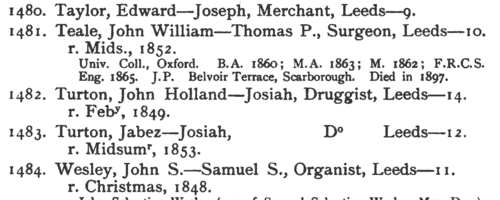
| Missionaries and contributors
(1864)
The Evangelical Magazine and Missionary Chronicle records the work of Christian missionaries throughout the world, and of the supporting missionary societies collecting money for the work in the British Isles. Contributions are listed by congregation, and by family members making donations.ASH. Cost: £8.00.  | Sample scan, click to enlarge
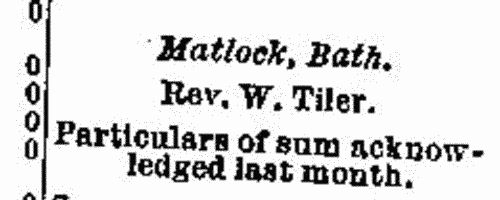
| Patentees of New Inventions
(1864)
Abstracts of British patents for new inventions applied for and granted from 1 January to 31 December 1864: giving date, name and address, and short description of the invention. It is then stated whether 'Letters patent sealed' or 'Provisional protection only'.ASH. Cost: £6.00.  | Sample scan, click to enlarge

| Boys entering Giggleswick School
(1865)
The school at Giggleswick in the West Riding of Yorkshire dates from at least 1507, but no register of the boys attending there has survived earlier than one started by the headmaster, the reverend George Style, in 1875. When the bursar, H. L. Mullins, prepared this, 'The Giggleswick School Register', printed in 1913, he was able to compile general details of some scholars from earlier years, but the concerted, reasonably complete, account starts in 1859. The details are arranged by term of entry, then alphabetically by surname and christian name. Typically each description gives full name; date of birth; name and address of father; date of leaving. Where known, Mullins then added a brief career synopsis, present address in 1913, or date of death.ASH. Cost: £4.00.  | Sample scan, click to enlarge
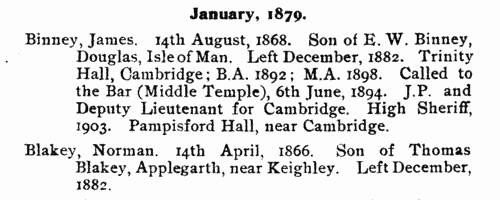
| Country Members of the Pharmaceutical Society
(1865)
The annual list of Members, Associates and Apprentices of the Pharmaceutical Society of Great Britain includes lists of London Members and Country Members (giving year of membership, number of certificate (if any), full name (surname first), and address: an asterisk indicates a Life Member); Associates admitted before 1 July 1842 (with full name, and where registered); Associates of the Society who had passed the Major Examination and were registered as Pharmaceutical Chemists, and Associates of the Society who had passed the Minor Examination and were registered as Assistants (year of admission, number of certificate, full name, and where registered); and Registered Apprentices (with date of registration, full name, residing with, and town).
ASH. Cost: £4.00.  | Sample scan, click to enlarge

| East Kent Registered Electors: Canterbury
(1865)
The poll for two knights of the shire to represent the Eastern Division of the county of Kent in parliament was taken 18 July 1865, the candidates being Sir Edward Cholmeley Dering, bart., (D), Sir Brook William Bridges, bart., (B), and Sir Norton Joseph Knatchbull, bart., (K). This poll book lists all registered electors, whether they voted or not, by electoral district (Ashford, Canterbury, Dover, Faversham, Hythe, Margate, Ramsgate, Romney, Sandwich, Sheerness, Sittingbourne, Whitstable and Wingham) and then by township or parish within which lay the property whereby the electors had qualified. The lefthand column gives sequential number in the whole volume; then follows the elector's full name, surname first, and his address (often elsewhere); and on the righthand side for whom he voted. When the elector was qualified in duplicate the vote is recorded opposite to the number upon which he claimed to vote at the polling booth, and wherever his name occurs elsewhere a reference is made, immediately after the address, to the number where his vote is recorded, with the initials of the candidates for whom he voted. Duplicate voters who were dead at the time of the election, or did not vote, are printed in italics to signify that they did not vote, or are stated to be dead once only; and wherever the names of such electors occur elsewhere references are made to the numbers where alone they are reckoned in the abstract of the poll as dead or not voting. Whenever a number only, without any other reference, follows the address, it denotes that at the number referred to, the elector is entered as not voting. ASH. Cost: £6.00.  | Sample scan, click to enlarge

|
Research your ancestry, family history, genealogy and one-name study by direct access to original records and archives indexed by surname.
|












